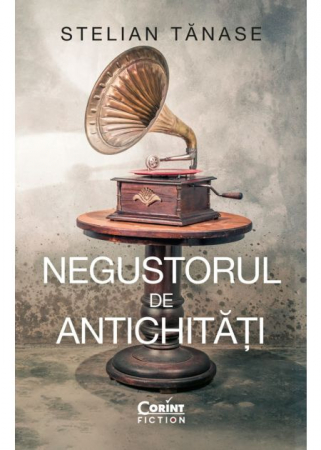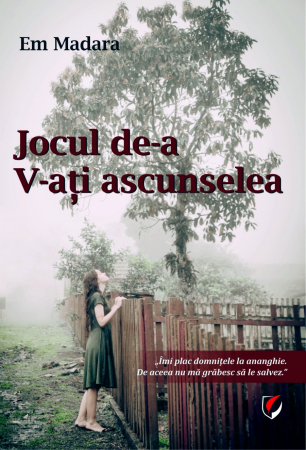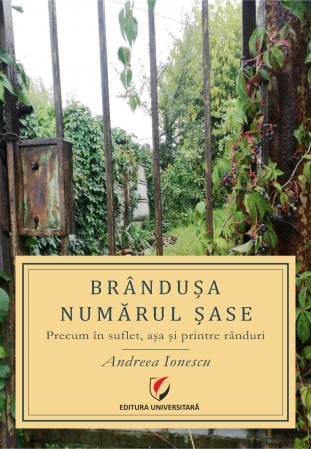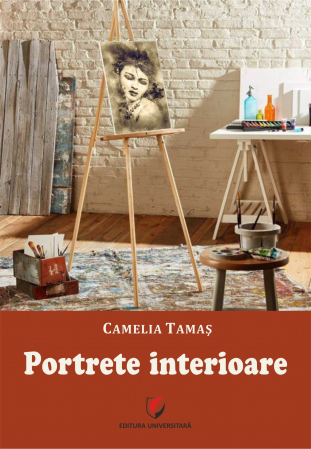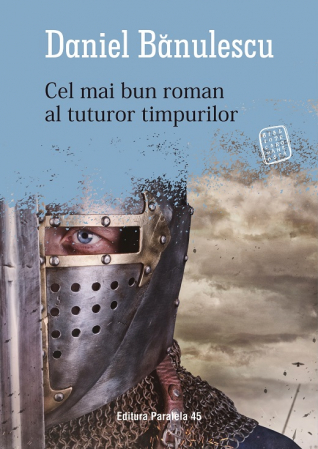Manuscript proposals: info@editurauniversitara.ro / 0745 204 115 //// Tracking orders Individuals / Sales:0745 200 718 / 0745 200 357 Orders Legal entities: 0721 722 783
Publisher: Cismigiu Books
Author: Elena Netcu
Edition: I
Pages: 234
Publisher year: 2023
ISBN: 978-606-28-1574-5
DOI: 10.5682/9786062815745
Product Code:
9786062815745
Do you need help?
0745 200 718
/
0745 200 357
- Description
- Download (1)
- Authors
- Content
- More details
- Reviews (0)
Kraina is a book about the painful present of a people over whom the terror of history has invaded, scorching the earth and destroying innocent lives. It is a book about survival, about pain and hope, about patience and faith, beyond the claws of death, beyond cruelty and the power to endure.
Elena Netcu
"Olena stayed that night by Pantile's bed, counting the drops of the infusion... one... two... a hundred... a thousand... moments of life that will bring a smile to the lips of the beloved man. He looked intently at her closed eyes and saw a slight tremor... He was waiting for them to open, to look at their blue with silver reflections like the sky of Ukraine and it even seemed to him that they were opening, it seemed to him that there were the ragged clouds of destiny, even he saw how the devastating smoke of the warplanes wrote words of fire in the sky of his country: "We will not be defeated, we will fight with our last strength, with stones, with rakes, with pitchforks, but we will fight! We will eat roots, earth, but we will fight!"
Elena Netcu
"Olena stayed that night by Pantile's bed, counting the drops of the infusion... one... two... a hundred... a thousand... moments of life that will bring a smile to the lips of the beloved man. He looked intently at her closed eyes and saw a slight tremor... He was waiting for them to open, to look at their blue with silver reflections like the sky of Ukraine and it even seemed to him that they were opening, it seemed to him that there were the ragged clouds of destiny, even he saw how the devastating smoke of the warplanes wrote words of fire in the sky of his country: "We will not be defeated, we will fight with our last strength, with stones, with rakes, with pitchforks, but we will fight! We will eat roots, earth, but we will fight!"
-
Kraina
Download
ELENA NETCU
I wrote and published since I was a student, many years ago. Being a literature teacher by training, I looked at the literary phenomenon "from the inside".
I made my debut in poetry, I flirted with essay writing and, for the most part of my life, I translated the life of Dobrogea in all its variety and complexity into literary fact, especially in what is most beautiful in the northern part, the Hercynian mountains, The Danube, on the bank of which I dreamed countless times, I watched the chaotic flight of birds but, above all, I lived in a fascinating ethnic diversity, among Turks, Tatars, Ukrainians, Lipovans and other nations, coming and going where history and the circumstances of life led these people to be patient, kind, gallant, picturesque, accepting each other's differences in religion, customs, habits, traditions, but living in perfect harmony.
My books reflect, for the most part, the amazing and fascinating legends of Dobrogea. This miraculous land has become for me a literary character that, if I could, I would absolutely project, as the philosopher would say. I just showed the world Dobrogea in all its greatness.
BY THE SAME AUTHOR:
Verse volumes:
Amphora in Uncontained, Harvia Publishing House, Tulcea, 2005
Ritual, Harvia Publishing House, Tulcea, 2007
The Knight of the Words, Karograf Publishing House, Tulcea, 2011
Wormwood, Karograf Publishing House, Tulcea, 2012
Seller of memories, Benefica Publishing House, Bucharest, 2016
Island of Solitude (poem), Timpul Publishing House, Iasi, 2021
Children's Poetry:
Chicken Mot, Benefica Publishing House, Bucharest, 2010
The exploits of the Motan Hat, Edirura Karograf, Tulcea, 2011
Alma knows the world, Pim Publishing House, Iasi, 2022
Prose:
Lenka, Benefica Publishing House, Bucharest, 2010
Shadows from Valea Rece, Letras Publishing House, Otopeni, 2013 (fantasy novel)
The Story of a Legionnaire, Letras Publishing House, Otopeni, 2016 (historical novel)
The Legend of Emir Nogai, Letras Publishing House, Otopeni, 2017 (mythological novel)
Exiles, Pim Publishing House, Iasi, 2019 (social novel)
Steps to Hell, Pim Publishing House, Iasi, 2019
Nedeia, Pim Publishing House, Iasi, 2019
At the edge of the world, Contraste culturale Publishing House, Giurgiu, 2020
Sari Saltuk Baba, (the mysterious road from the Orient to Dobrogea), Timpul Publishing House, Iasi, 2020
Man of the woods, Ex-Ponto Publishing House, Constanta, 2021
From the Caucasus in the four winds, Timpul Publishing, Iasi, 2021
Flight above the puddles, Timpul Publishing House, Iasi, 2022
Dobrogei Tribes, Timpul Publishing House, Iasi, 2022
I wrote and published since I was a student, many years ago. Being a literature teacher by training, I looked at the literary phenomenon "from the inside".
I made my debut in poetry, I flirted with essay writing and, for the most part of my life, I translated the life of Dobrogea in all its variety and complexity into literary fact, especially in what is most beautiful in the northern part, the Hercynian mountains, The Danube, on the bank of which I dreamed countless times, I watched the chaotic flight of birds but, above all, I lived in a fascinating ethnic diversity, among Turks, Tatars, Ukrainians, Lipovans and other nations, coming and going where history and the circumstances of life led these people to be patient, kind, gallant, picturesque, accepting each other's differences in religion, customs, habits, traditions, but living in perfect harmony.
My books reflect, for the most part, the amazing and fascinating legends of Dobrogea. This miraculous land has become for me a literary character that, if I could, I would absolutely project, as the philosopher would say. I just showed the world Dobrogea in all its greatness.
BY THE SAME AUTHOR:
Verse volumes:
Amphora in Uncontained, Harvia Publishing House, Tulcea, 2005
Ritual, Harvia Publishing House, Tulcea, 2007
The Knight of the Words, Karograf Publishing House, Tulcea, 2011
Wormwood, Karograf Publishing House, Tulcea, 2012
Seller of memories, Benefica Publishing House, Bucharest, 2016
Island of Solitude (poem), Timpul Publishing House, Iasi, 2021
Children's Poetry:
Chicken Mot, Benefica Publishing House, Bucharest, 2010
The exploits of the Motan Hat, Edirura Karograf, Tulcea, 2011
Alma knows the world, Pim Publishing House, Iasi, 2022
Prose:
Lenka, Benefica Publishing House, Bucharest, 2010
Shadows from Valea Rece, Letras Publishing House, Otopeni, 2013 (fantasy novel)
The Story of a Legionnaire, Letras Publishing House, Otopeni, 2016 (historical novel)
The Legend of Emir Nogai, Letras Publishing House, Otopeni, 2017 (mythological novel)
Exiles, Pim Publishing House, Iasi, 2019 (social novel)
Steps to Hell, Pim Publishing House, Iasi, 2019
Nedeia, Pim Publishing House, Iasi, 2019
At the edge of the world, Contraste culturale Publishing House, Giurgiu, 2020
Sari Saltuk Baba, (the mysterious road from the Orient to Dobrogea), Timpul Publishing House, Iasi, 2020
Man of the woods, Ex-Ponto Publishing House, Constanta, 2021
From the Caucasus in the four winds, Timpul Publishing, Iasi, 2021
Flight above the puddles, Timpul Publishing House, Iasi, 2022
Dobrogei Tribes, Timpul Publishing House, Iasi, 2022
Preface / 7
Chapter I. The Special Envoy from Abyss / 11
Chapter II. In a hospital in Poland / 40
Chapter III. In the footsteps of the Zaporizhzhya Cossacks / 89
Chapter IV. Khmelnytsky's dream / 100
Chapter V. Stepan Razin - the hatman of poverty / 166
Chapter VI. The shadows of the end / 226
Chapter I. The Special Envoy from Abyss / 11
Chapter II. In a hospital in Poland / 40
Chapter III. In the footsteps of the Zaporizhzhya Cossacks / 89
Chapter IV. Khmelnytsky's dream / 100
Chapter V. Stepan Razin - the hatman of poverty / 166
Chapter VI. The shadows of the end / 226
There are writers whom chance makes you meet at a certain moment thanks to a book and they arouse your interest. That's how it was to be with Elena Netcu, a writer with a wide movement on the publishing scene. He has so far published six volumes of poems, three books for children and thirteen novels. His activity as a novelist is impressively prolific. Her first novel appeared in 2010, which means that one could say: the year and the novel. As a profession, she is a teacher of Romanian language and literature, having the first degree and numerous didactic works, among which those concerning the stylistics of literary texts are distinguished. She is also a passionate and careful essayist, her essays showing her passion for poetry. This record says a lot about Elena Netcu. Intellectually and spiritually active, in love with literature, diligent in researching literature, enthusiastic in her critical readings, she does not see her daily life as a toil, but as a pleasure tending towards pleasure. I got to know her thanks to a novel in manuscript, "Kraina".
You can usually go through a novel easily and you can write a few lines about it, if it piques your interest. This time, however, I lingered a long time after reading the novel. Something had turned me on. Maybe it was the subject of the novel. The novelist did not live in Ukraine and still writes about the current Russian-Ukrainian war.
A well-documented historical novel based at the same time on a thorough follow-up of the news. It describes the suffering of the Ukrainians attacked by Putin's army of prisoners whose punishment was prescribed to be enlisted as mercenaries. This army made of assembly soldiers, who have no idea who they are fighting for and against whom they are fighting, has something apocalyptic in it. They kill children, women, men, young and old, rape and destroy everything in their path. And behind them, small trained troops bomb the cities, leaving people without homes and supplies. The surviving Ukrainians end up living in basements left intact after the bombings.
It is clear that this war is not really a war, as Putin claims. But what it is, you will be enlightened by a historical foray into the 17th century, when hetman Bogdan Khmelnitki founds the Ukrainian state, breaking with his allies until then, the king of Sweden and the sultan, and swearing eternal loyalty to Moscow: "forever united with Moscow". It becomes strange, for those who did not know the history, that Putin considers Ukrainians to be Russia's vassals, and the planned war is not a war, but an incursion to punish a people that he considers traitors. He betrayed his oath and through his policy of emancipation, he brings NATO to Russia's borders. This criminal incursion, made by Putin not to conquer territories or "save" the Russians in Ukraine, but for punitive purposes, fills you with horror.
The goal is, in the last instance, a terrorist one: to cause suffering and incite terror. But the prose writer does not let these things be seen, she does not offer them explicitly, but deals, as the demands of prose demand, with people's lives. Besides the killing of children, women and the elderly, of those left without families, without shelter, without food, one of the most painful themes of the novel is the loss of love.
Love stories take root, but the war stops them. Even between the Ukrainian protagonist, Pantilei, left without a family, killed by the bombings, a love story is born with Olena, after he was injured and arrived at a hospital in Poland. But this story ends suddenly, when Pantilei goes back to the country to fight the invaders. Again, a foray into the history of the Cossacks makes it clear that such sacrifices were part of the code of behavior of the Zaporizhzhya Cossacks. The subject of the novel, treated in the way outlined before, made me linger, to find out more about the writer Elena Netcu. And, indeed, I found out that he had a permanent attraction to get to know the cohabiting nationalities of Dobrogea.
The novel "Kraina" is, in fact, a shift in the stories about the minorities in Dobrogea. Minorities living together with the Romanians created what the prose writer Constantin Novac called the "Dobrogean interethnic model", which became a permanent column of the "Tomis" magazine for a long time. Well, Elena Netcu, since she got close to these minorities, including the Ukrainian one, has the ability to write about the war in Ukraine. He knows the Ukrainians, he knows their history, he knows their feelings. It is not a novel written out of the desire to exploit a possible literary brand, a hot topic, but a novel originating from attachment to some people, people who today suffer undeservedly, following an outbreak of barbarism. It is an emotional novel, because it is written with love and it is a novel of our time, which leaves a testimony about our existence, the people of a part of Europe and the whole world, at the beginning of the millennium which, of course, we saw completely different in our perspectives on the future, just a few years ago.
Who would have thought that, after there were victories in the previous century, such as those against German Nazism, Italian fascism and Japanese militarism, which made us look towards a clear future, we will have to deal with terrorism, an insidious pandemic and the war, which will shatter our hopes? So that the novel "Kraina" is one that urges us to meditate on the "terror of history" that comes in new poses, to show us, once again, the dark facet of humanity: the conflicting starts, which cannot be stopped, always have an outlet , no matter how much we try to suppress them. No matter how emancipated people are, they remain gates through which the darkness of history can come out and wreak havoc.
The reunion between Pantilei and Olena, of course, does not solve the problem, but it brings to the fore one of the strongest forces planted in the spirit of humanity: the hardening of resistance in the face of evil, the decision to fight to the death and beyond death against the oppressors.
Written with sensitivity to the human realities of the wartime, well documented and well-instrumented epic, the novel "Kraina" excites and has an important role in making us even more determined to be with the long-sought Ukrainian people.
Dan Persa
You can usually go through a novel easily and you can write a few lines about it, if it piques your interest. This time, however, I lingered a long time after reading the novel. Something had turned me on. Maybe it was the subject of the novel. The novelist did not live in Ukraine and still writes about the current Russian-Ukrainian war.
A well-documented historical novel based at the same time on a thorough follow-up of the news. It describes the suffering of the Ukrainians attacked by Putin's army of prisoners whose punishment was prescribed to be enlisted as mercenaries. This army made of assembly soldiers, who have no idea who they are fighting for and against whom they are fighting, has something apocalyptic in it. They kill children, women, men, young and old, rape and destroy everything in their path. And behind them, small trained troops bomb the cities, leaving people without homes and supplies. The surviving Ukrainians end up living in basements left intact after the bombings.
It is clear that this war is not really a war, as Putin claims. But what it is, you will be enlightened by a historical foray into the 17th century, when hetman Bogdan Khmelnitki founds the Ukrainian state, breaking with his allies until then, the king of Sweden and the sultan, and swearing eternal loyalty to Moscow: "forever united with Moscow". It becomes strange, for those who did not know the history, that Putin considers Ukrainians to be Russia's vassals, and the planned war is not a war, but an incursion to punish a people that he considers traitors. He betrayed his oath and through his policy of emancipation, he brings NATO to Russia's borders. This criminal incursion, made by Putin not to conquer territories or "save" the Russians in Ukraine, but for punitive purposes, fills you with horror.
The goal is, in the last instance, a terrorist one: to cause suffering and incite terror. But the prose writer does not let these things be seen, she does not offer them explicitly, but deals, as the demands of prose demand, with people's lives. Besides the killing of children, women and the elderly, of those left without families, without shelter, without food, one of the most painful themes of the novel is the loss of love.
Love stories take root, but the war stops them. Even between the Ukrainian protagonist, Pantilei, left without a family, killed by the bombings, a love story is born with Olena, after he was injured and arrived at a hospital in Poland. But this story ends suddenly, when Pantilei goes back to the country to fight the invaders. Again, a foray into the history of the Cossacks makes it clear that such sacrifices were part of the code of behavior of the Zaporizhzhya Cossacks. The subject of the novel, treated in the way outlined before, made me linger, to find out more about the writer Elena Netcu. And, indeed, I found out that he had a permanent attraction to get to know the cohabiting nationalities of Dobrogea.
The novel "Kraina" is, in fact, a shift in the stories about the minorities in Dobrogea. Minorities living together with the Romanians created what the prose writer Constantin Novac called the "Dobrogean interethnic model", which became a permanent column of the "Tomis" magazine for a long time. Well, Elena Netcu, since she got close to these minorities, including the Ukrainian one, has the ability to write about the war in Ukraine. He knows the Ukrainians, he knows their history, he knows their feelings. It is not a novel written out of the desire to exploit a possible literary brand, a hot topic, but a novel originating from attachment to some people, people who today suffer undeservedly, following an outbreak of barbarism. It is an emotional novel, because it is written with love and it is a novel of our time, which leaves a testimony about our existence, the people of a part of Europe and the whole world, at the beginning of the millennium which, of course, we saw completely different in our perspectives on the future, just a few years ago.
Who would have thought that, after there were victories in the previous century, such as those against German Nazism, Italian fascism and Japanese militarism, which made us look towards a clear future, we will have to deal with terrorism, an insidious pandemic and the war, which will shatter our hopes? So that the novel "Kraina" is one that urges us to meditate on the "terror of history" that comes in new poses, to show us, once again, the dark facet of humanity: the conflicting starts, which cannot be stopped, always have an outlet , no matter how much we try to suppress them. No matter how emancipated people are, they remain gates through which the darkness of history can come out and wreak havoc.
The reunion between Pantilei and Olena, of course, does not solve the problem, but it brings to the fore one of the strongest forces planted in the spirit of humanity: the hardening of resistance in the face of evil, the decision to fight to the death and beyond death against the oppressors.
Written with sensitivity to the human realities of the wartime, well documented and well-instrumented epic, the novel "Kraina" excites and has an important role in making us even more determined to be with the long-sought Ukrainian people.
Dan Persa
If you want to express your opinion about this product you can add a review.
write a review
Customer Support Monday - Friday, between 8.00 - 16.00
0745 200 718 0745 200 357 comenzi@editurauniversitara.ro
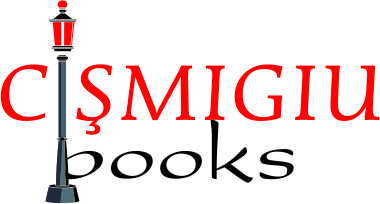
![Kraina - Elena Netcu [1] Kraina - Elena Netcu [1]](https://gomagcdn.ro/domains/editurauniversitara.ro/files/product/large/kraina-192786.jpg)


